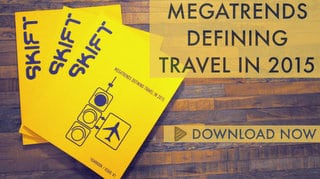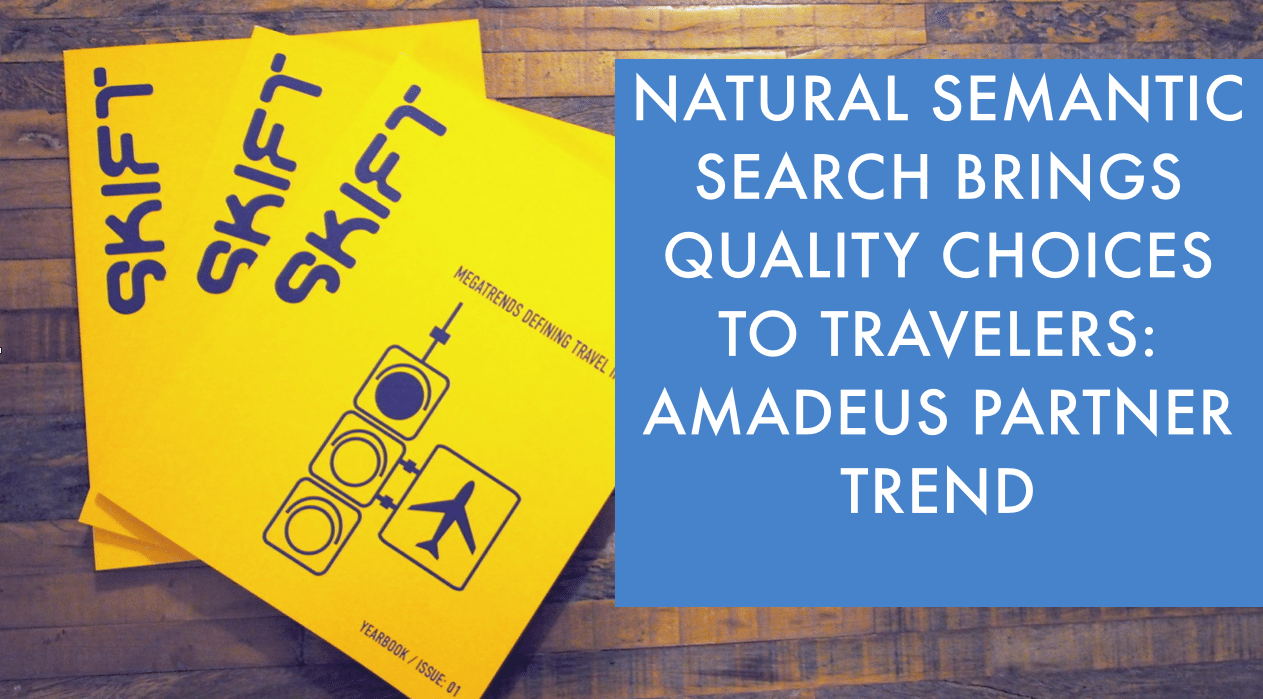Skift Take
Consumers are increasingly growing to expect a more simplified travel planning experience. For online travel brands, it’s a matter of adapting to game-changing technology like semantic search.
This sponsored content was created in collaboration with a Skift partner.
Earlier this month we launched our first ever magazine, “Megatrends Defining Travel in 2015“, where we identify the global trends in travel in 2015 and beyond, and focus on three emerging key themes: Mobile. Seamless. Experiential. Below is an extract from a trend by our magazine partner and sponsor Amadeus.
When it comes to search, travelers are no longer satisfied with keyword- matched results. They’ve come to expect a higher level of sophistication, and a more tailored, personalized trip planning experience.
Where page-ranking algorithms once reigned as the best option to match travelers with the seemingly right hotel, a progression towards search based on natural queries, past behaviors, and multiple data points is on the horizon. Semantic search is leading the charge towards seamless travel planning and has been a boon for the travel industry, especially for smaller companies who’ve set out to compete with the legacy search giants.
It’s been working too. According to Carsten Kraus, CEO of FACT-Finder, OTAs who have implemented semantic search on their site have reported a 12% increase in sales conversions. Semantic search technology has grown to understand and respond to natural language. Travelers can phrase questions, like “Where can I go with a beach and nightlife scene that also has things for kids to do?” and expect results that are relevant, in context, and with intent. It’s learned to adapt to misspellings, abbreviations, and slang terms.
 A search for “Travelers between 25 and 300 going from NYC to London” wouldn’t just match keywords in the results pages – it will smartly curate results like hotels, flights, and activities for the age segment, location, and personal data points. It will recognize that NYC means New York City, and find the appropriate airport. It will also recognize that the “300” in “25 to 300” is likely a typo, and instead whittle down the results to reflect options for twenty and thirty somethings.
A search for “Travelers between 25 and 300 going from NYC to London” wouldn’t just match keywords in the results pages – it will smartly curate results like hotels, flights, and activities for the age segment, location, and personal data points. It will recognize that NYC means New York City, and find the appropriate airport. It will also recognize that the “300” in “25 to 300” is likely a typo, and instead whittle down the results to reflect options for twenty and thirty somethings.
User experience is improving for searchers as well. Using multiple drop-down menus to select individual search criteria is becoming outdated. Instead, travel sites are moving towards a singular search field where customers can enter queries in their own words, keeping simplicity and usability at the core of the trip planning.
Hotels are benefiting from semantic search by being more easily searchable. Before the introduction of Google’s Hummingbird, its complete search engine overhaul rooted in semantic, the hospitality industry was plagued with low quality hotels “gaming” the search engine to get to page one – essentially applying gray area tactics like keyword stuffing for rank. Now, with the rise of semantic search, hotels can be discovered by prospective customers based on quality content, user data and past behaviors.
There is a big opportunity for travel brands to adopt semantic search while it’s still in its infancy. While the natural language abilities and contextual awareness are already appealing, semantic search will only continue to become more functional. Consumers will continue to pour data and user- generated content onto the web at a rapid rate, adding more chances for travel companies to cater search results personalized to the individual traveler.
Today Amadeus provides open search capabilities that respond to semantic search queries. Find examples of how Amadeus is currently building and progressing semantic search tools at Amadeus.net.
This is an extract, get this and all the other trends, download the magazine for full trends for 2015.
We want to thanks our magazine sponsors Virgin Atlantic, Amadeus and Egencia for making this possible.
Download the copy for deeper read. Share it if you like it and think others can benefit from them.
Have a confidential tip for Skift? Get in touch
Tags: semantic

